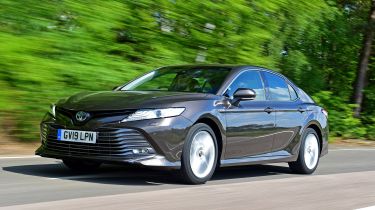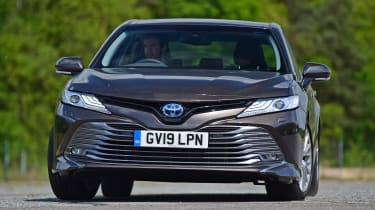Toyota Camry (2019-2022) - MPG, CO2 and running costs
The Camry boasts low emissions, relatively good fuel economy and strong residual values for its class

Just so you know, this is an older review of the 2019-2022 Toyota Camry. If you are interested in news about the latest Toyota models, please follow the link provided.
The appeal of any hybrid-powered car lies mainly in reduced running costs versus conventionally powered petrol models. The Camry delivers in this department with claimed economy of 53.3mpg, although we only managed 37.9mpg on test in mixed driving. We managed 417 miles from the Camry’s 50-litre tank and calculated that an average user will spend £1,842 on fuel over 12,000 miles, or £3,071 over 20,000 miles.
CO2 emissions are low at 98g/km, which in turn makes for cheap first-year road tax (usually rolled into the on-the-road price) and – perhaps most importantly for this sort of car – low company car tax costs. Toyota expects that 80 per cent of Camry models will be driven by fleet users; a BiK rate of 23% applies and undercuts the majority of the competition.
Insurance groups
The Toyota Camry sits in insurance groups 31 and 32, with the top-spec Excel occupying the latter. This is a little higher than conventionally powered rivals like the Skoda Superb and Vauxhall Insignia, most probably thanks to the potential for complex repairs to the Camry’s powertrain – not that it’s likely to go wrong.
Depreciation
Our experts predict that the entry-level Camry Design model will hold on to just over 45 per cent of its value over three years and 36,000 miles; the top-spec Excel version will retain around 44.3 per cent over the same period. Given the good level of standard kit on the base model and its stronger residuals, we’d suggest only stepping up to Excel trim if you really need any of its added equipment.









